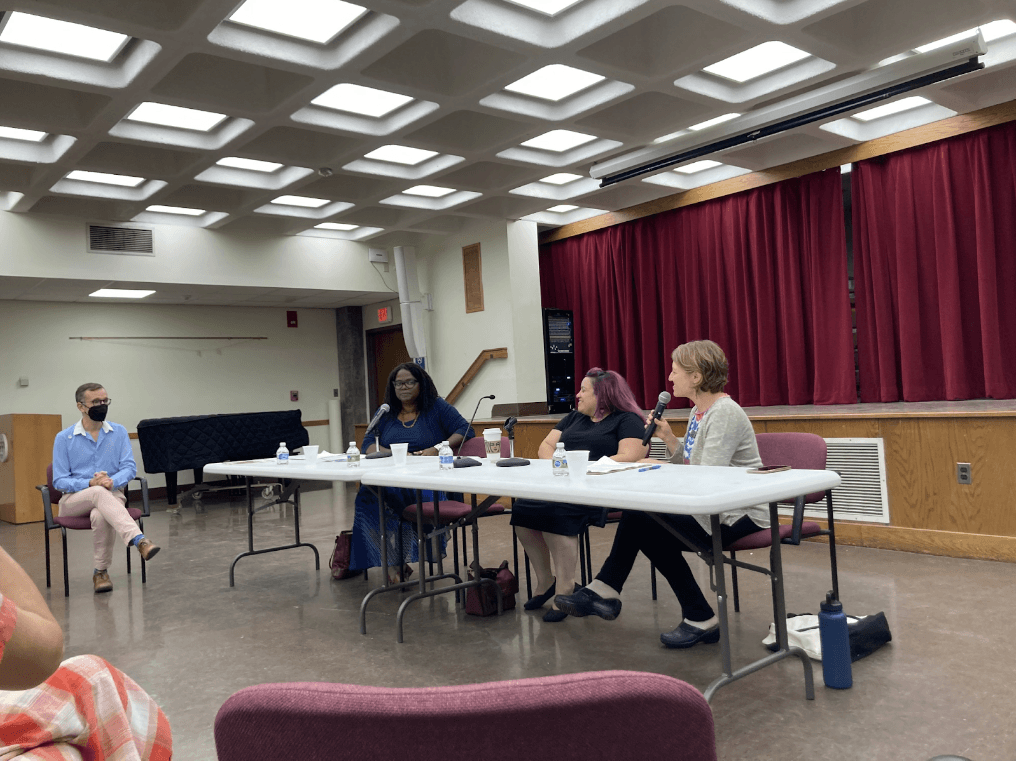Erased History Berkshire Athenaeum Panel. Photo Credit: Molly Merrihew
by Kaia Jackson, WAM Theatre’s Director of Community Engagement
Leading up to Cadillac Crew, and in solidarity with Banned Books Week, WAM Theatre hosted a series of Erased History conversations between BIPOC scholars, storytellers, community leaders, and audiences. The honored speakers included Heather Bruegl, Onawumi Jean Moss, Gwendolyn VanSant, Dr. Frances Jones-Sneed, Dr. Eden-Reneé Hayes, Amber Chand, and Nicole M. Young-Martin. Together, they offered compelling stories and reflections on the lives, legacies and liberatory work of Black and Indigenous Women who have been all but erased from our history books.
Each gathering took shape in a different location in Berkshire County, including The Clark Art Institute in Williamstown, Berkshire Athenaeum in Pittsfield, and Stockbridge Library. Each meeting of the minds offered a unique opportunity to learn about women who have been personally significant and impactful in the lives and liberation work of each speaker. This inquiry into ancestors, those who built the spiritual foundations and movement strategies upon which these women stand, invited community members to consider the women of color in contexts past and present who are working towards Civil Rights.
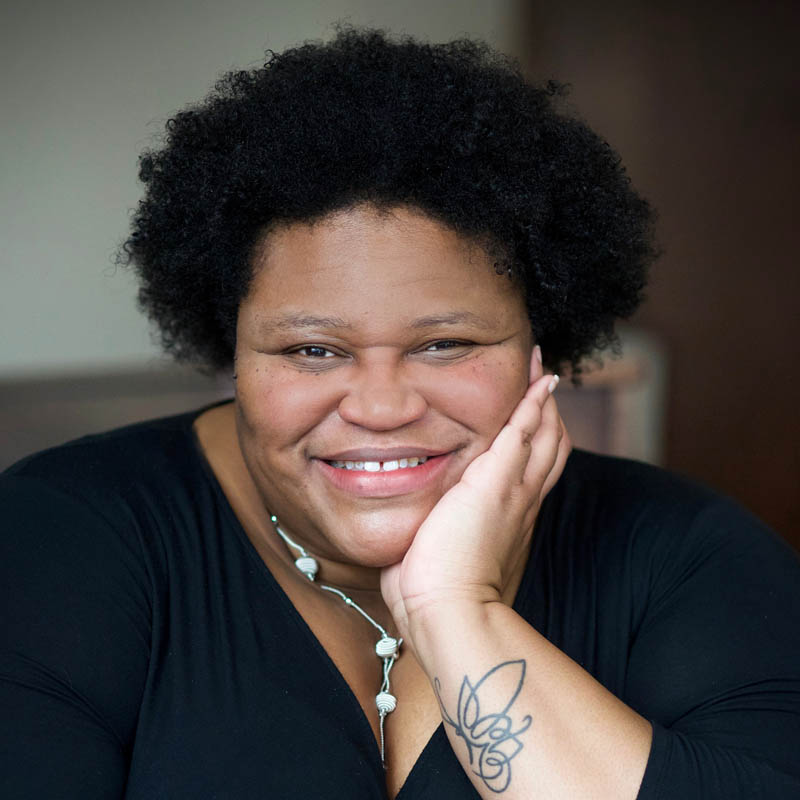
At our kickoff event at The Clark Art Institute, Performance Artist, Educator and WAM Board Member Nicole M. Young-Martin (at left) invited audiences to imagine the experience of erasure through an original first-person monologue written from the perspective of Claudette Colvin. In many ways, Colvin’s narrative epitomizes the way in which countless Black Civil Rights activists were written out of history. Indeed, Cadillac Crew references Claudette Colvin’s refusal to give up her seat on a Montgomery bus prior to Rosa Parks’ similar protest, and acknowledges the internal and external pressures that led to her erasure, including the stigma connected with her Black, pregnant, teenage body.
Following this evocative sharing, renowned scholar Dr. Frances Jones-Sneed (at right) retold the legacies of numerous Berkshire-based Black educators and pathfinders. She noted that local leaders such as thesehave not only created spaces of radical hospitality for Black community members, but actively reshaped educational and cultural institutions for the benefit of all. By the end of the gathering, audience members were reflecting on their own movement stories and relationality to histories of oppression.
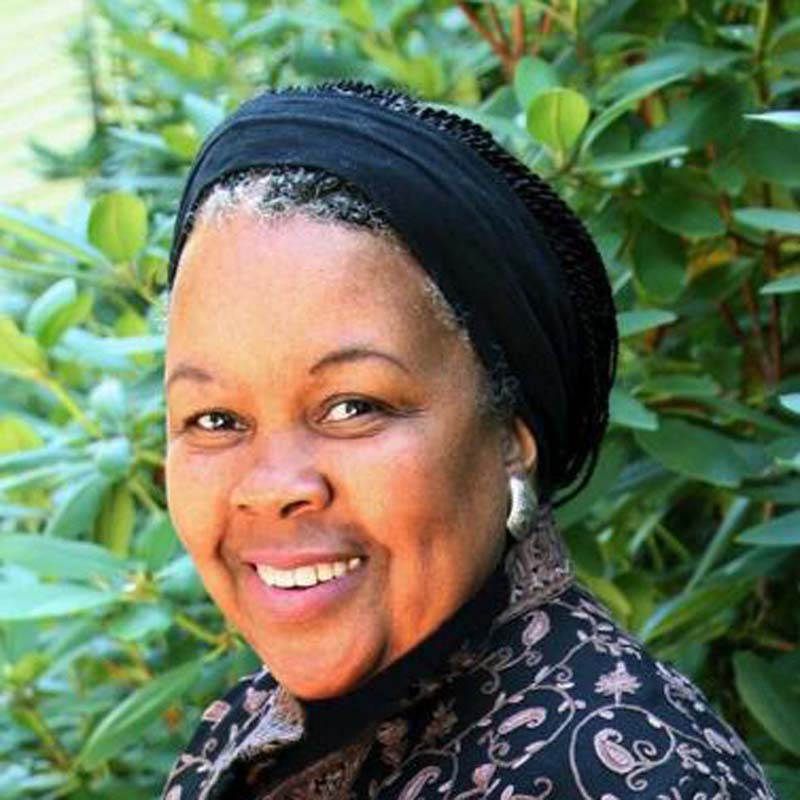
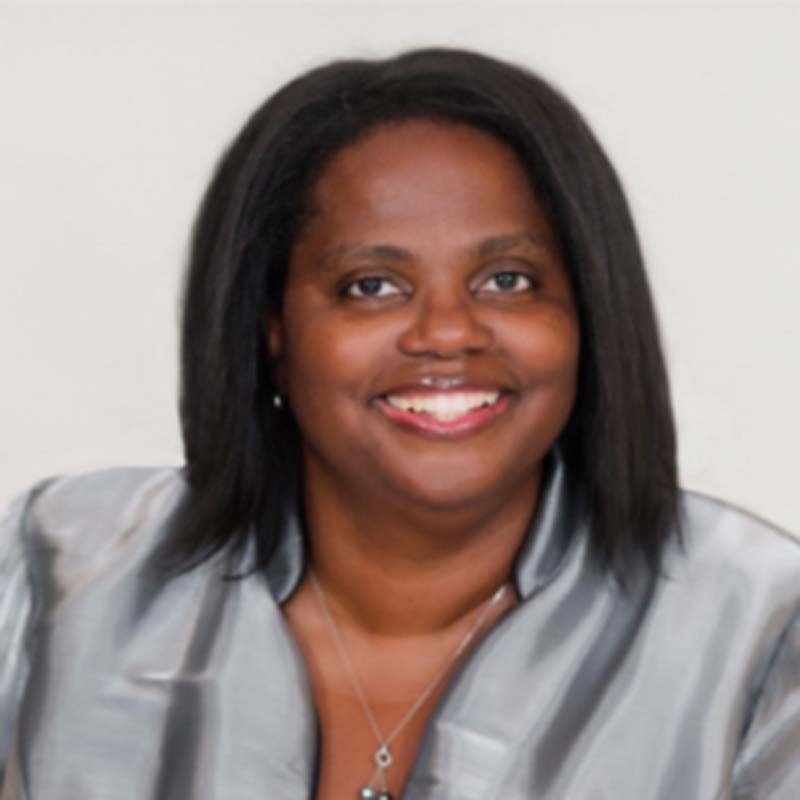
Later in the week, at the Berkshire Athenaeum in downtown Pittsfield, we heard from community leader, thought-leader, and current civil rights activist Gwendolyn VanSant (at left). It was striking to hear the litany of names of Black women who have personally touched her life in multifaceted ways, from Audre Lorde to adrienne maree brown. VanSant is a pioneer in her own right, as the CEO and Founding Director of BRIDGE, a minority and women-run organization dedicated to cultural competence and social justice with a race, gender and poverty lens.
Meanwhile, Indigenous Historian Heather Bruegl (Oneida Nation Citizen/Stockbridge-Munsee Descendent) (at right) reflected on the impact of her initial disconnection from her own cultural heritage. The generational impact of experiences such as forced relocation, conversion, and boarding school is still felt today among Indigenous communities originating in the Berkshires, and beyond. From this context, Bruegl reflected on the power of having someone to look up to who looked like her, and who reflected her indigenous cultural and ancestral heritage.
Closing the conversation with a dynamic exchange, VanSant and Bruegl’s insights prompted audience members to identify their personal “homework,” or the steps that they plan to take to educate their friend and neighbors about erased histories in the Berkshires. It was potent to witness how storytelling prompted plans for direct action through this singular event.
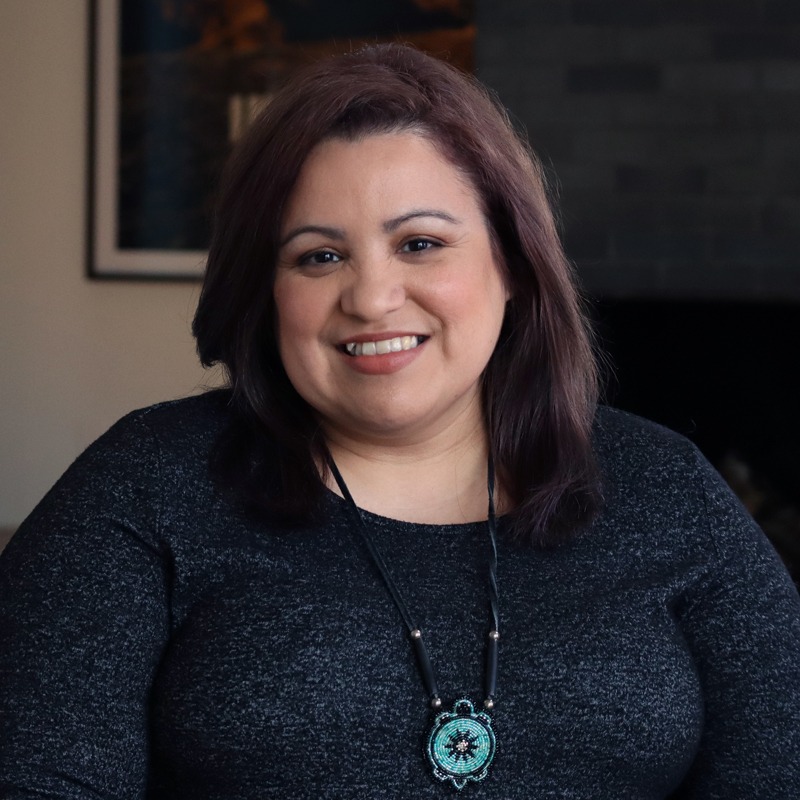
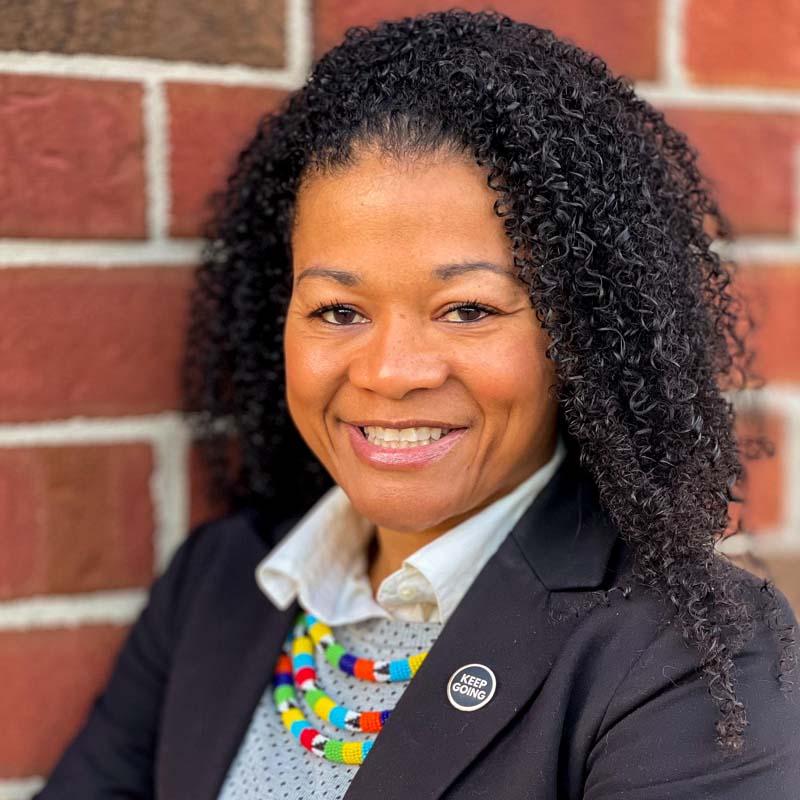
At our concluding conversation at Stockbridge Library, Social Anthropologist and teacher Dr. Eden-Reneé Hayes underscored the ways in which racial oppression and gendered oppression have colluded in “intersecting invisibility” of Black women such as Anthropologist Elizabeth Stubbs Davis from our history books. While one audience member was quick to question the role of husband Allison Davis in that erasure, Hayes redirected the audience’s attention to the larger social context in which the Black couple in a majority White space was trying to eke out an existence in academia. While it is not known whether Elizabeth Stubbs Davis was ever able to complete her PhD, as did her husband, it is clear that her research methods sought to give voice to people within her own community in new ways.
Celebrated storyteller Amber Chand joined Dr. Eden-Reneé Hayes at the Stockbridge Library and closed out the event with a call for each of us to embrace the transformative power of storytelling in our own lives and bodies. What stories are crying to be heard within each of us? What stories can we reclaim, or tell in a new way? How can we make more space for ourselves to tell the stories that will set us free? By the end of Chand’s sharing, veritable goosebumps could be felt among many attendees, and we were left with questions that may have a life of their own in each of us.
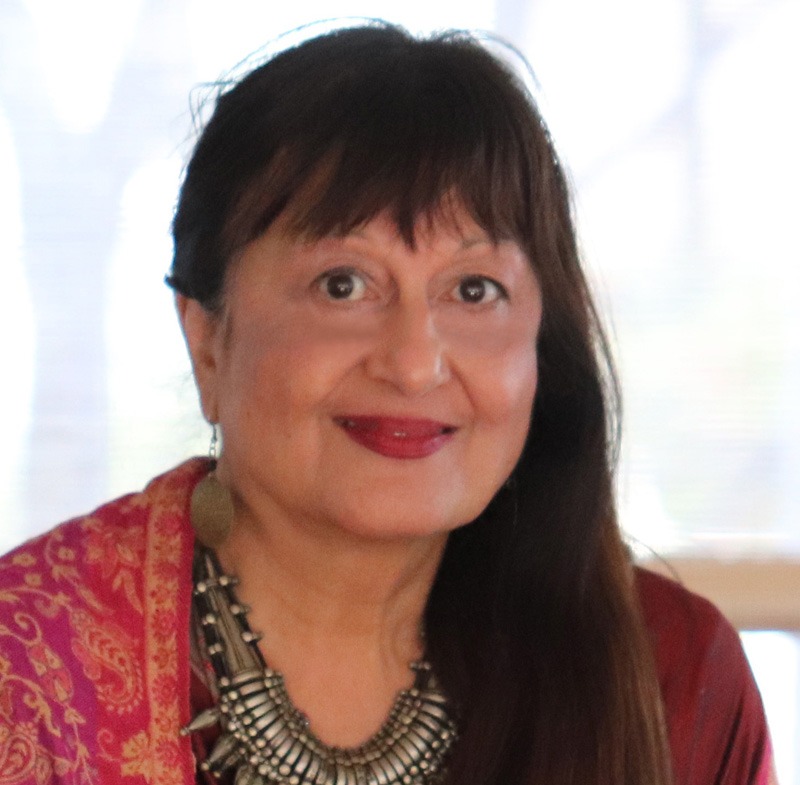
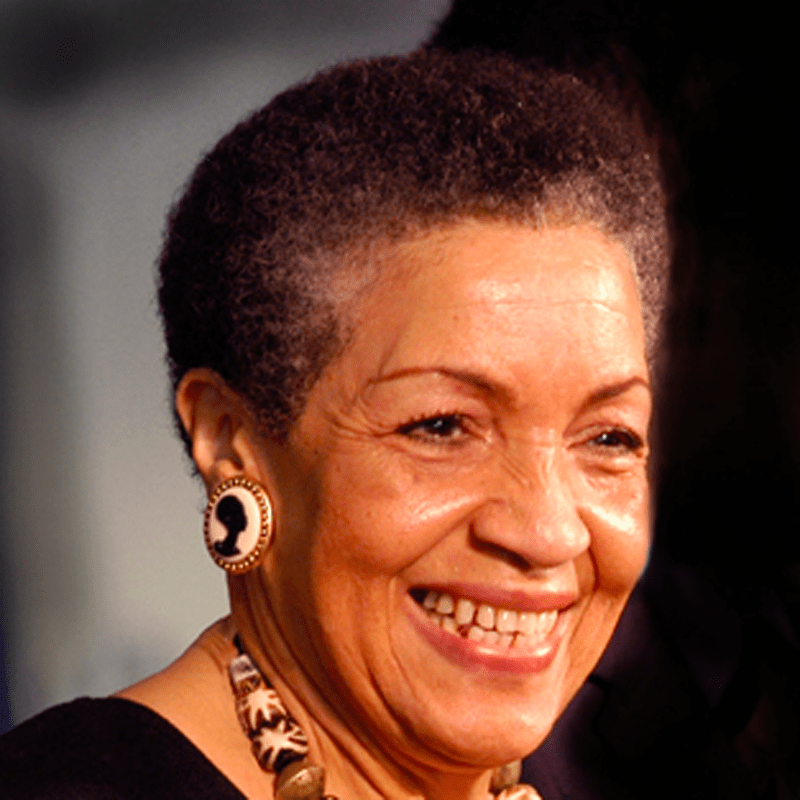
“Somehow we are made to have access to less knowledge because of this woman’s erasure. All of us. What I find is, many times, people find that as a Black person’s problem or a Brown person’s problem. No. It’s every body’s problem. Why? Because you are operating in a way, in a condition of not knowing, and not knowing that you don’t know. And that is dangerous.”- Onawumi Jean-Moss
For those of you who missed our in-person gatherings, it’s not too late to tune into our recorded virtual conversation with Storyteller Onawumi Jean-Moss and a second appearance of Social Anthropologist and teacher Eden-Reneé Hayes. Onawumi Jean-Moss reflected on the galvanizing work of Civil Rights Activists including Diane Nash and Dorothy Irene Heights, President of the National Council of Negro Women. In this age of social media, it can be easy to think of a network as synonymous with Facebook, Twitter, Instagram or Tik Tok. However, Onawumi Jean-Moss reminds us of other possibilities: “They were team-builders. Talk about network, what was their network? Black colleges and Black churches.” Perhaps we too can begin to map out our own teams and community networks that support team-building towards dismantling white supremacy.
As a moderator and witness, I felt a combination of gratitude for the invitation to receive these untold stories, and grief for the reality that they have been long unheard. As community members interrogated their own role in seeking out silenced histories, and educating others about all that they learned, I couldn’t help but wonder what future generations will be reading about the US in 2022. And I couldn’t help but hope that the next generation of girls of color in Berkshire County will be able to hear from and see themselves in the words of some of our honored speakers.
This series was generously funded by the Brabson Library and Educational Foundation.

